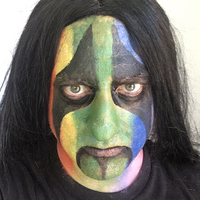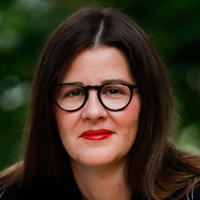On making things you believe in
Singer-songwriter Sedona Schat and writer/producer Noah Yoo on managing your own expectations, navigating challenges as a duo, and keeping your creative spirit alive.You started performing as Cafuné in 2014 when you were both students at NYU. How has your relationship with your own project changed since then and how has it remained the same?
Noah: Early on, Sedona and I both regarded the band as our side project. It was our excuse to work together outside of the musical projects that we were both pursuing in our solo careers. It was kind of an outlet for us to make something cool and see where our interests converge. But then when it started getting attention, it quickly became our full-time project because we were like, “This thing has legs. Let’s see where this can go!”
Sedona: As a young college student, I just imagined that things would fall into a place in a certain way. And I think working on the project after we graduated, it’s become even more of a passion project. I’m committed to this regardless of it fulfilling my expectations for it or not. I still feel that the heart of what we’re going for is still intact. I think there’s a spirit in the music that still feels like it’s there, even though the sonic identity has shifted a little bit.
Speaking about sonic identity, a lot of your songs are super high energy, but a lot of them are also pretty melancholic. But whether the song is high energy or melancholic, your sound is always very identifiable. How did you find your distinct sound, and learn how to strike that balance between experimentation and maintaining a form of consistency?
Noah: Even from the jump, the through line has always been on some level, Sedona’s songwriting and my arranging. Those two components have always been in play with each other, regardless of whether it’s a more electronic track or a more rock-oriented song. It’s been good for us to branch out on what our music can sound like. Writing different configurations and playing live has had a big influence on our songs and songwriting because in a live context, you really figure out what kind of dynamics make sense and what the crowd responds to in the most effective way.
Sedona: I think sort of inherent to our dynamic, Noah wants to build a box for us to work inside of, and I want to have freedom to try whatever. I think those two things end up balancing each other out.
I also run a creative project with one of my close friends and a lot of the time it’s really exciting, but then when we disagree, it feels much more personal and stressful. How do you guys work through those challenges, but also ensure that it doesn’t interfere with your personal relationship?
Sedona: It has interfered with our personal relationship. We’ve gone through a lot of difficult periods, and I think have gotten better at communicating through conflict, because conflict inevitably arises. Even though there are a lot of things that bond us together in the first place, there’s also a lot of things that we disagree on. I think we’ve just learned through time, what to expect from the other person or what triggers the other person. The continued dedication and commitment feels like a foundation of strength.
Noah: You’re right. There were periods leading up to the album when Sedona and I were really not on good terms as friends, and we were not speaking. It just is what it is, but one thing that Sedona has helped me realize is that people say don’t take it personally, and that’s fine except for when you’re making art. When you’re talking about art, if someone doesn’t like a decision you made, it’s personal. What we both realized is our art can be personal and it’s okay. Commerce is not personal. To fight about artistic decisions and to disagree on logistical things are different and should be treated differently.
A bunch of interviews with Terry Lewis and Jimmy Jam have been coming out, and all the interviews are just like, “Yeah, we’ve never fought a day.” I’m just like, “Great. Do I just need to find someone who I’m not fighting with?” But at the same time, there are other creative partnerships where genius stuff has been made because the people literally hate each other and want to never see the other person again. So, there are no rules.
Sedona: We’re somewhere between those two.
You recorded most of Running during the pandemic. How did putting together your debut album during this intensive time affect both your work and process?
Noah: During the period of time when lockdown was serious in New York and everyone was being super careful, Sedona and I weren’t hanging out to do studio sessions or record, even though we live in the same borough. We kind of reverted to working remotely and sent each other files. During that period we determined that we were going to do an album. Initially the plan was to do more smaller releases, but with such a large window of potential, we thought, “Okay, this is a good opportunity for us to make this album.” It gave us something to focus on outside of the pandemic and everything going on. It’s been weird for sure, because on some level we kind of wondered, are we going to be able to play these songs live? When are we going to put these out? These were the question marks hanging over us during the process, but we thought, “At some point the album will be finished, and then after that, we can worry about all of the other things.”
Sedona: I was really glad to just have the literal time and space to write alone in a space. Pre-pandemic, I was living in an apartment with four people, and I had the opportunity to live alone for a little while. I feel like I was able to process some things and by extension, write some of those songs in that space. Several of the things that we ended up finishing were partial ideas that had existed pre-lockdown. Such a large amount of time had passed since our EP, and we had just done singles. For the people who had been listening to our music for a while, it felt like we owed them a larger project. We also just spent a lot of time coming up with different kinds of release plans, like putting out two songs at a time or two EPs. I was really happy when we settled on doing a tight album. It felt like a statement, because everything previous to that hadn’t really been that definitive.
How do you know when a product or when an album is finished, especially as a duo?
Sedona: It’s not an easy or straightforward process. We had several songs where I thought we were in danger of overworking it, and there were versions of songs that I was listening to in January 2020 that I thought were done. I think Noah is much more detail oriented. It takes a lot more for him to feel satisfied about the way a recording is. It was sort of a convoluted process.
Noah: Yeah. I go back and forth on anything that I make all the time, to be honest. I’ll write something and be convinced it’s the greatest thing ever, and then come back to it 30 minutes later and think it’s crap, and I never want to listen to it again. I read an interview where Daft Punk said that they basically wrote “One More Time” in 1999, and then just shelved it for a year. They just forgot about it and then came back two years later and said, “This is still pretty good.” That’s when they decided it was cool. Not all the songs on the album are like that, but there are a couple productions and tracks on there that have been floating around on my hard drive for a few years. It wasn’t until we revisited them that we felt it aligned with the sound we’re trying to do now.
Sedona: I feel like our process is taking a song from a demo to a finished recording, but not in a traditional way, where we make a fully new recording. It’s more like we’re adding and taking away layers on this original demo and building it into that final version. Knowing when something is done or what stage it really is at is sometimes never clear.
Noah: After the fourth or fifth heated discussion about the album is when it is done. After someone threatens to take my hard drive away is when the album is done!
As far as your creative work is concerned, how do you individually or collectively define success and failure?
Sedona: I think we both, as a band, imagined success as being able to tour and continue making music. Failure for me personally is losing the drive, because sometimes I do feel like I lose my drive and motivation.
Noah: I think failure for me would be putting something out that I’m not proud of. That maybe also informs why it’s hard to release music for me, because I think that I over analyze things. As for success, as far as I’m concerned, we are successful. The band was never intended to be anything more than a college project and there are still people who want to listen and are interested. Anytime I get a little message on YouTube or any of the places where people are reaching out to say that they have been moved by the music, I feel successful.
I know that you guys donate the proceeds from most of your songs and shows to organizations. Has your goal ever been to make a living from performing as a duo? And if not, what do you see as the relationship between your music and the business side of things?
Noah: Because we’re still unsigned, and we’ve always self-released our music, it’s given me a pretty real taste of what the realities of streaming economics are. That’s why playing live shows is definitely a priority for us. The main way that we would want to earn an income as a band moving forward is through shows and sync licensing. It’s not going to be on streaming, regardless of whether we get a deal. You need to have sustained, continued viral success to make a living on streaming, and that just requires a totally different type of infrastructure.
Sedona: It doesn’t really feel that realistic, to be honest.
Noah: No, and at least not with what we want to do. It’s tough, because you want to show that you are serious enough about this to be able to do it for money and to show people we’re worth their time and investment, but you also don’t want to move disingenuously or make things that you don’t necessarily see yourself being stoked on. The older I get, the more strongly I feel about that. On some level, I’ve also kind of always thought to myself that I needed to have another plan. I mean, I’m sure you know, Asian parents are Asian parents. Even going into music school, my parents were like, “You should also be minoring in computer science.” That also has an effect on how I work. On some level, I think I want to make what I want to make and if there’s an audience for it, I want to cultivate that audience and cater to them. I want to make sure that what I’m putting out there is as earnest and as real for them as it is for me. That ends up being my priority.
Sedona: Yeah. I agree. I think the first order of business for us has always just been making things that we stand by and that impact people and that genuinely feel good to us.
Noah, how does being a music writer affect the way that you approach making your own music, and does it make you more hesitant to release songs?
Noah: Absolutely. A hundred percent. I had a good conversation with a former Pitchfork person who went into the artist side of things a couple of years ago. They’re not an artist, but they make music, and they gave me some obvious advice, but it was good. He said two things. One, you’re going to have to leave at some point. If you want to do this, you will have to leave. Two, you have to be good, and make sure your stuff is something that people can stand behind. I kind of really took that to heart.
What advice would you give young people who are looking to pursue their creative passions, even as they navigate big life transitions, expectations, and uncertainty?
Noah: I try to carve out a little bit of time, however small it is, to do the musical equivalent of doodling—just kind of making stupid little beats or working on a synth patch or just figuring out how to get a certain guitar sound on the computer. Even these tiny little habits anchor my brain in a place where I can remember what I want to be focused on with my time.
Sedona: We were talking about this a little bit earlier, but I think when you’re navigating your own expectations and other things that you’re obligated to do, being really hard on yourself is not actually all that helpful. If I want to get myself to practice or to be creative, if I want to create that space for myself, it’s better for it to be additive and for it to be a source of joy.
What is something that you wish someone told you when you began on this journey?
Sedona: It isn’t all just going to fall into place when you graduate. It didn’t for us, and that’s totally fine. Feeling like I haven’t done enough or I’m behind comes from these expectations that we set up, which I have found to be really inaccurate.
Noah: People in the music industry love to act like once you pass like 25, you’re dead.
Sedona: Late bloomers!
Noah: If there was anything that I wish someone had told me, backup your files more than once. Buy another hard drive, spend another $100 and copy your shit again, because it’s going to fail.
Noah Yoo and Sedona Schat Recommend:
Cervo’s the restaurant
The deli that’s on the corner of Essex and Canal. They have splash watermelon slushies and I like to get the passion fruit watermelon one.




